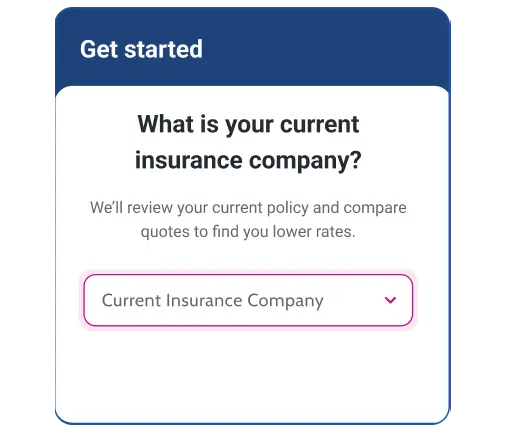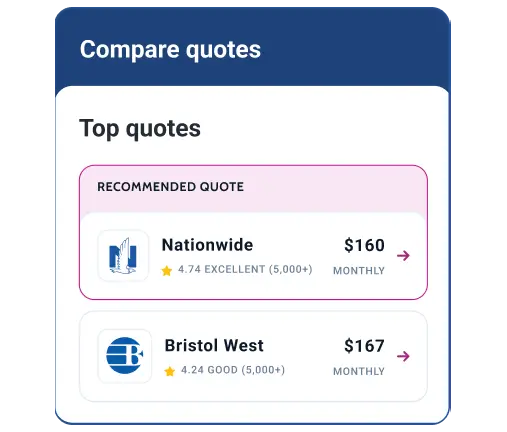Wouldn't it be nice to spend less on ho-hum necessities like car insurance? Understanding what determines your auto insurance premiums can uncover new ways to save. Auto insurance rates depend on factors such as your age, gender, location, the kind of car you drive, your driving record and possibly even your credit score. Here are 12 things that can influence the cost of your car insurance.
1. Your Location
Car insurance premiums vary from state to state, and even from one ZIP code to another. Why?
- Big-city drivers face greater risk of accidents, car theft or vandalism, so they generally pay more for car insurance.
- Car repairs and medical care for injuries are more expensive in some areas than in others.
- Weather-related risks that can damage vehicles, such as wildfires or windstorms, are more common in certain locations.
Learn more: Will My Car Insurance Go up if I Move?
2. Your Age
Younger, less experienced drivers are statistically more likely to drive dangerously and to be involved in fatal accidents, data from the National Highway Traffic Safety Administration (NHTSA) shows. As a result, teens and young adults typically pay the highest rates for auto insurance.
Once you turn 25, car insurance premiums typically go down and continue to drop as you get older. Generally, drivers over 55 pay lower rates; however, at age 75 or so, premiums typically begin to rise again.
3. Your Gender
Women are statistically less likely to be involved in car accidents, and the accidents they do have tend to be less severe, the Insurance Information Institute reports. In states that allow insurance companies to consider gender when setting insurance premiums, women usually pay less for car insurance than men.
4. Your Marital Status
Data shows that married people are less likely to file auto insurance claims than single people. As a result, married couples typically enjoy premiums 5% to 15% lower than singles. Married couples with two or more cars may also get price breaks for insuring multiple vehicles.
5. Your Driving History
Insurance companies review your driving record when setting your insurance premiums. Safe drivers are generally less apt to get into accidents, so they typically pay less for auto insurance.
Conversely, you might pay more for car insurance if you have a history of moving violations for dangerous habits such as speeding or reckless driving. Being at fault in an accident or having a DUI/DWI on your record are also likely to boost your car insurance costs.
6. The Vehicle You Drive
Auto insurance rates may vary based on the vehicle you drive, including factors such as:
- How much your car costs to repair
- How expensive your car is to replace
- Whether your vehicle is popular with car thieves
- The size of the engine
- The car's safety record and features
- How much damage the vehicle is likely to cause in a collision
Whether the car is financed is also a factor; lenders typically insist you carry more than the minimum required amount of insurance.
Learn more: What Are the Cheapest Cars to Insure?
7. Type and Amount of Insurance Coverage
State laws generally require drivers to purchase a minimum amount of liability coverage. Some also require personal injury protection insurance to cover medical expenses after an accident. Lenders may have their own insurance requirements for financed vehicles.
Beyond these basic requirements, you can purchase additional insurance, such as comprehensive and collision coverage, for greater protection. You can also opt for more liability or personal injury coverage than your state's minimums, and add extras like rental car coverage or windshield glass coverage. Typically, premiums rise as you add more coverage.
Learn more: How Much Car Insurance Do I Need?
Stop overpaying for insurance
Get startedResults will vary and some may not see savings.
8. Your Deductible
The deductible is the amount you must pay out of pocket when you file a car insurance claim. For instance, if you choose a deductible of $500, you'll need to pay that amount for damages when you file a claim, before your insurance kicks in.
How a deductible works:
Damages in filed claim: $3,000
Deductible amount: $500
Total amount insurance company will cover: $2,500 ($3,000 - $500)
Car insurance policies usually offer deductibles ranging from $0 to $2,500. Opting for a higher deductible can lower your insurance premiums. However, avoid raising your deductible beyond what you could afford to pay if you had an insurance claim.
9. Your Vehicle Usage
Statistically, the more time you spend on the road, the more likely you are to get into a car accident. As a result, high-mileage drivers (typically defined as driving 15,000 miles or more annually) may pay more for car insurance. Those who drive less than 12,000 or 10,000 miles per year, on the other hand, are often eligible for lower rates.
A driver with a daily commute usually pays higher premiums than someone who only drives for pleasure. If you don't drive much, choosing low-mileage car insurance options such as pay-per-mile auto insurance or usage-based insurance could mean significant savings.
10. Your Claims History and Insurance History
Car insurance companies examine your history of filing claims when setting premiums. Having many claims suggests that you're likely to file more claims in the future. Insurers usually increase your rates to compensate for this risk.
You might also pay higher premiums if you've ever gone without car insurance (known as a lapse in coverage) or have failed to pay your premiums.
11. Your Insurance Company
Each insurance company sets its own rates. Different providers may charge different premiums for the same kind and amount of coverage. If your current rates are too high, getting quotes online from several insurance companies can give you an idea of the savings each insurer might offer. Be careful to compare the same type and amount of coverage.
Price is just one consideration when purchasing car insurance, however. You should also investigate each company's financial stability and check customer reviews to see how well they handle claims.
12. Your Credit Score
Insurance companies in most states can consider your credit score when calculating your car insurance premiums. A higher score typically translates to lower premiums.
The credit-based insurance score insurers use differs from the scores lenders use. However, it's based on similar information, so checking your regular credit score can give you an idea of how your credit-based insurance score might impact your car insurance costs.
How to Lower Your Car Insurance Rates
Some factors affecting your car insurance premiums are outside your control, but there are still several steps you can take to lower your costs.
- Investigate discounts. Check to see what discounts each insurance carrier offers. You might be eligible for the following discounts on car insurance:
- Being a high school or college student with good grades
- Paying your annual premium upfront
- Setting up auto payments
- Getting digital instead of paper statements
- Belonging to organizations or working for employers that offer insurance discounts as a perk
- Driving fewer than 12,000 miles annually
- Owning a home
- Having a vehicle with factory-installed anti-theft or safety equipment
- Remaining with the same insurer for a certain number of years
- Cut back on coverage. Dropping unnecessary coverage, such as roadside assistance or rental car reimbursement, can save you money. If your car is paid off and you could afford to replace it, see how much eliminating collision and comprehensive coverage might save.
- Increase your deductible. Raising your deductible generally lowers your insurance premiums. Just make sure you have enough savings to pay your deductible in case of a claim.
- Drive safely. Avoiding speeding tickets, aggressive driving and other risky behavior can reduce the cost of car insurance. Some insurance companies lower your rates if you stay accident-free or complete a defensive driving course.
- Drive less. Reducing your mileage generally saves you money. Investigate pay-per-mile auto insurance or usage-based car insurance, which may save you even more if you're willing to have your driving habits monitored.
- Bundle insurance policies. Purchasing two or more insurance policies from the same provider, such as home and auto coverage, is known as bundling and typically earns a discount.
- Comparison shop. Shop around for car insurance once a year or so to see if you can get a better price. You can compare car insurance costs quickly by using an online marketplace to get quotes from multiple providers in one place. Experian's car insurance comparison tool gathers quotes from top insurance carriers for your current auto insurance coverage, so it's easy to see if you can save.
Frequently Asked Questions
How Much Does Car Insurance Cost?
Car insurance costs an average of $1,765 per year, according to 2023 AAA data. This estimate is based on full coverage auto insurance for a driver under age 65 who has over six years of driving experience, lives in a suburban or urban area and has no accidents on their records. Your cost will depend on a variety of factors, including your age, gender, vehicle, mileage driven, driving record, coverage amount and deductible.
When Does Car Insurance Go Down?
Your car insurance premiums typically go down once you turn 25 and continue to drop as you get older. Generally, premiums cost the least when you're in your 50s and 60s, then begin rising when you turn 75.
However, there's no guarantee. Insurance companies weigh multiple factors when setting your car insurance rates. Issues such as a history of reckless driving or auto accidents could have a bigger effect on your premiums than your age.
Your car insurance may also go down once your car is paid off. To protect their investment, lenders typically require comprehensive and collision coverage on financed vehicles. When your loan is paid off, you can opt to drop this coverage, reducing your premiums.
Does Filing a Claim Increase Insurance Rates?
Insurance carriers typically increase your rates after you file a claim for an auto accident where you are at fault. The claim may need to be over a certain dollar amount before it affects your premiums. Your premiums may also rise after one or more accidents where you're not at fault.
Premium increases can vary depending on factors including the insurer's policies, the size of the claim and the frequency of claims. In some states, insurance companies can't raise your premiums after a claim for an accident that wasn't your fault. Carrying accident forgiveness insurance may also prevent your rates from rising, even if you caused an accident.
The Bottom Line
Improving your credit score may help lower your car insurance rates. Paying down high-interest debt, bringing late accounts current and paying your bills on time can all help boost your credit score. Set up free credit monitoring to track your progress. A good credit score can make it easier to qualify for credit cards and loans at lower interest rates, saving you money on more than just auto insurance.
Learn More About Factors that Will Determine Your Car Insurance Rate
- Which Companies Offer the Best Auto Insurance Rates?
Auto insurance companies base your rates on a variety of factors, so the best car insurance provider can vary from person to person. Here’s what to know. - Do Auto Insurance Companies Consider Your Credit Score?
Auto insurance companies might consider a credit-based insurance score when reviewing applications or setting premiums. - What Is a Car Insurance Deductible?
A car insurance deductible is a specific amount of money you must pay on a claim. The rest of the claim is paid by your auto insurance policy. Learn... - Do New Cars Cost More To Insure?
It may cost more to insure a new car depending on factors such as the type of vehicle, the amount of coverage you choose and your driving record. - Best Car Insurance Discounts
Review these 21 top car insurance discounts to see if you might be able to save money. - The 10 Most Expensive States for Car Insurance
The cost of premiums can vary widely, not only from person to person, but also much more broadly, such as which state you drive. - The 10 Cheapest States for Car Insurance
Drivers in the five states with the highest average annual premiums pay about twice that of the five least expensive auto premium states to insure their rides. - What Is Full Coverage Car Insurance?
Full coverage car insurance is a general term that means your policy includes liability, comprehensive and collision insurance. - How Much Does Your Insurance Go up After an Accident?
If you get in a car accident, here's what to know about how it might affect your insurance premiums. - How to Get Car Insurance After a DUI
An impaired-driving conviction may not keep you from getting auto insurance, but coverage will cost more—maybe a lot more—for several years afterward.




